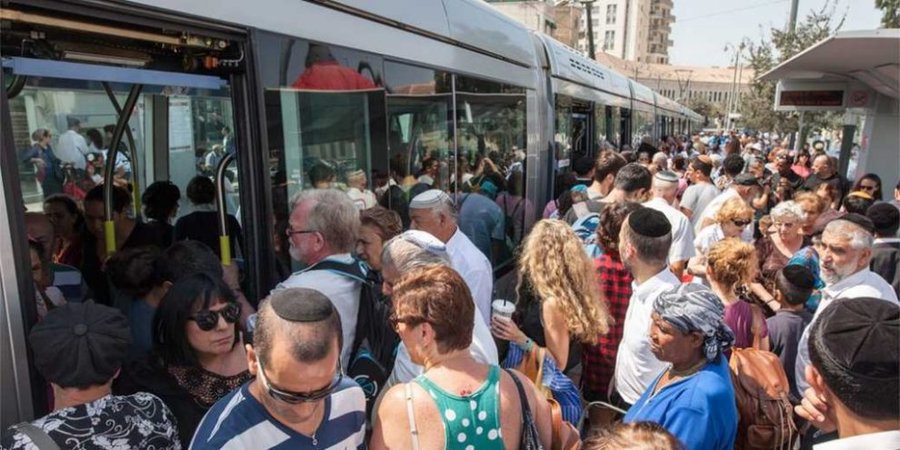European and North American railway manufacturers Bombardier, Siemens, and Alstom got cold feet on the project, which crosses through East Jerusalem.
The Ministry of Finance boasted yesterday of the groups that submitted bids in the tender for building the light rail in Jerusalem. Accountant General Rony Hizkiyahu said, "Receiving the bids indicates the confidence of the private sector partners in the government's plans." The actual situation is much less positive.
Of the eight groups that took part in the preliminary stages, only two eventually submitted bids in the tender. None of three of the biggest European and North American railway manufacturers - Bombardier, Siemens, and Alstom - took part in it. The companies did not officially withdraw from the process for political reasons, but it will probably be preferable to include representatives of the Ministry of Foreign Affairs in the next tender.
For most of the international transportation and infrastructure companies, Jerusalem is 'outside the pale.' In contrast to celebrities who decide not to appear in Israel and countries unwilling to host Israeli athletes, the undeclared boycott by transportation companies passed quietly, but its effect on the Israeli economy is much greater.
The latest and most resounding withdrawal from the tender was by Alstom. The company notified its partners, Electra and Dan, that it was asking them for compensation in the event of its having to pay fines under French law. This request could not be granted, and the entire group withdraw from the tender.
Sources close to the company claim that Alstom's board of directors in France made the decision at the last minute over the heads of its representatives in Israel. After pressure was exerted on it, the board decided against participating in a project that crosses the Green Line "in disputed areas in Jerusalem."
Alstom already has extensive operations in Israel. The company maintains railway cars for Israel Railways, is responsible for the communications components in the Tel Aviv light rail Red Line, which is currently being built, and manufactures carriages for the Jerusalem light rail Red Line, which also has stops in Shuafat, Beit Hanina, in East Jerusalem. The network's depot, maintenance and operations center, is also located beyond the Green Line.
Nevertheless, even in the previous round, when it signed the franchise to operate CityPass, Alstom tried to reduce its footprint in Jerusalem. Shortly after winning the tender, it sold its share of CityPass, thereby confining its part in the project to maintenance and operations. The company said at the time that the reason was economic, not political, but it is apparently easier for a French company to portray itself as an equipment supplier than as the owner of a company operating beyond the Green Line. In the current tender, Alstom planned to participate solely as an equipment supplier, but eventually decided against even that. According to infrastructure sector sources, management changes at Alstom are increasing the company's vulnerability to pressure by political groups in France and the Arab world.
With the operation of the Jerusalem light railway Red Line, public attention was drawn to the decision by French company Veolia, the railway operator, to withdraw from the project. In this case, it was clearer that the reasons were public opinion in France (although the company took care to deny it). Veolia found itself in an odd trap, however - it wanted to sell its share in the project, and found a buyer - Egged. The state, however, refused to allow Egged to become a public transportation monopoly in Jerusalem. Veolia was forced to operate the railway for a number of years until a solution was found. Court petitions were filed in France demanding that Veolia and Alstom be ordered not to build and operate a railway in what was called occupied territory.
Alstom's bypassing the tender in Jerusalem could cause the company additional problems. Alstom is due to compete in tenders to sell carriages for the Tel Aviv light rail, the greater Tel Aviv area metro, and other tenders. Will the government agree to let a company that is in effect boycotting Jerusalem compete to sell trains for use in Tel Aviv?
Minister of Transport Yisrael Katz has not yet spoken on the matter; the next government will have to deal with the problem.
As if that were not enough, the state also has also problems with the actual bidders. Spanish railway company CAF had to contend with its workers' committee, which announced that it would not agree to work in Jerusalem. This could disrupt CAF's work if it wins the tender. CAF's competitor as a railway supplier, Chinese company CRRC, is no stranger to Israel - it manufactures the train that will travel on the Tel Aviv light rail Red Line - but it is also active in Iran and sells equipment for the railway in Mashhad.
The Trump administration is boycotting every company doing business with Iran as part of its actions against the Iranian nuclear program, but Israel has so far refrained from doing this, and is allowing CRRC to make Israel its spearhead for penetrating the European market. The Chinese entry into the infrastructure market in Israel is alarming the US. Chinese digging of tunnels so close to the south Ministry of Defense headquarters compound (the Kirya) in Tel Aviv is liable to arouse suspicion. A most serious problem arose in Haifa, where a Chinese company is scheduled to operate the new Haifa Bay Port, together with the regular Haifa Port, where many US warships anchor. This led to a crisis with the US Department of Defense.
Related News

